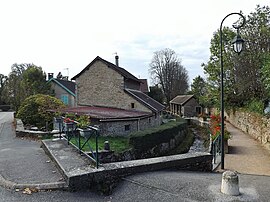La Balme-les-Grottes
| La Balme-les-Grottes | ||
|---|---|---|
| Commune | ||

The Lavoir (Public laundry)
|
||
|
||
| Coordinates: 45°51′12″N 5°20′13″E / 45.8533°N 5.3369°ECoordinates: 45°51′12″N 5°20′13″E / 45.8533°N 5.3369°E | ||
| Country | France | |
| Region | Auvergne-Rhône-Alpes | |
| Department | Isère | |
| Arrondissement | La Tour-du-Pin | |
| Canton | Morestel | |
| Intercommunality | Isle-Crémieu | |
| Government | ||
| • Mayor (2014–2020) | Martine Gabeure | |
| Area1 | 14.61 km2 (5.64 sq mi) | |
| Population (2010)2 | 915 | |
| • Density | 63/km2 (160/sq mi) | |
| Time zone | CET (UTC+1) | |
| • Summer (DST) | CEST (UTC+2) | |
| INSEE/Postal code | 38026 /38390 | |
| Elevation | 192–383 m (630–1,257 ft) (avg. 210 m or 690 ft) |
|
|
1 French Land Register data, which excludes lakes, ponds, glaciers > 1 km² (0.386 sq mi or 247 acres) and river estuaries. 2Population without double counting: residents of multiple communes (e.g., students and military personnel) only counted once. |
||
1 French Land Register data, which excludes lakes, ponds, glaciers > 1 km² (0.386 sq mi or 247 acres) and river estuaries.
La Balme-les-Grottes is a commune in the Isère department in the Auvergne-Rhône-Alpes region of south-eastern France.
The inhabitants of the commune are known as Balmolans or Balmolanes.
La Balme-des-Grottes is located some 32 km east by north-east of Lyon and 11 km south of Ambérieu-en-Bugey on the right bank of the Rhône. The Rhône also forms the departmental border between Isère and Ain. Access to the commune is by the D65 road from Leyrieu in the south which passes through the length of the commune and the village and continues north to join the D1075 west of Vertrieu. The D52B branches from the D65 in the commune and goes south to Saint-Baudille-de-la-Tour. The D52C also branches from the D65 at the same intersection and goes south-east to Charette. The commune is mixed forest and farmland with dense forests in the north-east.
The Rhône river forms the entire western border of the commune with no crossing points anywhere in the commune. The commune is covered by a network of canals linked to the Rhône and the Ruisseau de Laye which is a minor loop of the Rhône.
Neanderthal men from the Middle Paleolithic period left flint tools and food scraps in the La Balme caves. Around 15000/13000 BC, in the late Upper Paleolithic, Cro-Magnon hunters did the same in the shelter of the cave: flints and bones of reindeer, ibex, aurochs, and horses have been found.
...
Wikipedia



